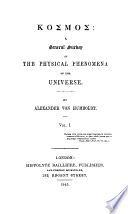Quotes from book
Kosmos

Cosmos: A Sketch of a Physical Description of the Universe is an influential treatise on science and nature written by the German scientist and explorer Alexander von Humboldt. Cosmos began as a lecture series delivered by Humboldt at the University of Berlin, and was published in five volumes between 1845 and 1862 . In the first volume of Cosmos, Humboldt paints a general “portrait of nature”, describing the physical nature of outer space and the Earth. In the second volume he describes the history of science. Widely read by academics and laymen alike, it applied the ancient Greek view of the orderliness of the cosmos to the Earth, suggesting that universal laws applied as well to the apparent chaos of the terrestrial world. Humboldt goes on to suggest that when one contemplates the beauty of the cosmos, one can obtain personal inspiration and a beneficial, if subjective, awareness about life.Cosmos was influenced by Humboldt's various travels and studies, but mainly by his journey throughout the Americas. As he wrote, “it was the discovery of America that planted the seed of the Cosmos.” Due to all of his experience in the field, Humboldt was preeminently qualified for the task to represent the universe in a single work. He had extensive knowledge of many fields of learning, varied experiences as a traveler, and the resources of the scientific and literary world at his disposal.Cosmos was highly popular when it was released, with the first volume selling out in two months, and the work translated into most European languages. Although the natural sciences have diverged from the romantic perspective Humboldt presented in Cosmos, the work is still considered to be a substantial scientific and literary achievement, having influenced subsequent scientific progress and imparted a unifying perspective to the studies of science, nature, and mankind.

Kosmos (1845 - 1847)
Context: From the remotest nebulæ and from the revolving double stars, we have descended to the minutest organisms of animal creation, whether manifested in the depths of ocean or on the surface of our globe, and to the delicate vegetable germs which clothe the naked declivity of the ice-crowned mountain summit; and here we have been able to arrange these phenomena according to partially known laws; but other laws of a more mysterious nature rule the higher spheres of the organic world, in which is comprised the human species in all its varied conformation, its creative intellectual power, and the languages to which it has given existence. A physical delineation of nature terminates at the point where the sphere of intellect begins, and a new world of mind is opened to our view. It marks the limit, but does not pass it.

Kosmos (1845 - 1847)
Context: The principal impulse by which I was directed was the earnest endeavor to comprehend the phenomena of physical objects in their general connection, and to represent nature as one great whole, moved and animated by internal forces. My intercourse with highly-gifted men early led me to discover that, without an earnest striving to attain to a knowledge of special branches of study, all attempts to give a grand and general view of the universe would be nothing more than a vain illusion. These special departments in the great domain of natural science are, moreover, capable of being reciprocally fructified by means of the appropriative forces by which they are endowed.

Kosmos (1845 - 1847)
Context: While we maintain the unity of the human species, we at the same time repel the depressing assumption of superior and inferior races of men. There are nations more susceptible of cultivation, more highly civilized, more enobled by mental cultivation than others, but none in themselves nobler than others. All are in like degree designed for freedom; a freedom which, in the ruder conditions of society, belongs only to the individual, but which, in social states enjoying political institutions, appertains as a right to the whole body of the community.